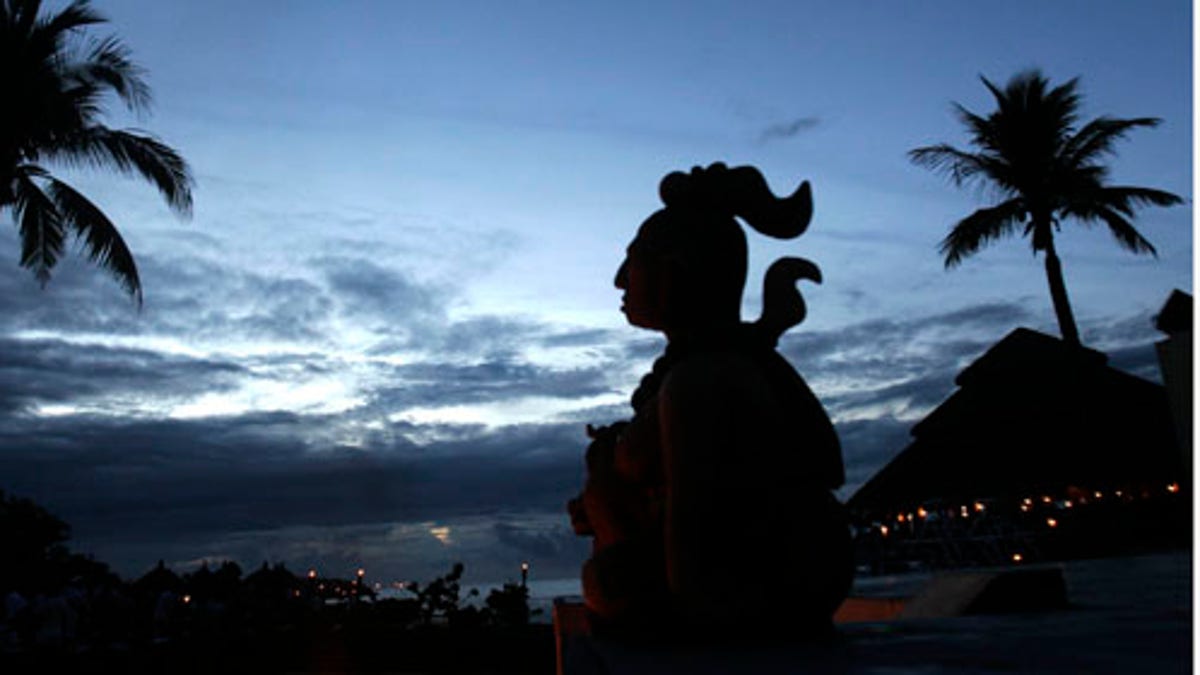
FILE - This June 1, 2007 file photo shows a Mayan statue stands in Playa Del Carmen, Mexico, where people will gather before making their way across the Yucatan Channel, to the Cozumel Island, in a ten mile pilgrimage in honor of the Mayan goddess Ixchel. Only a year is left before Dec. 21, 2012, when some believe the Maya predicted the end of the world. While some doomsday theorists may suggest putting together survival kits, people in southeastern Mexico, the heart of Maya territory, plan to throw a yearlong celebration. And to make a profit while they party.(AP Photo/Israel Leal) (AP)
The tourism industry in Mexico is hoping that its visitors over the next year, rather than panic over the end-of-the-world prediction that comes with the looming Dec. 21, 2012, take a different approach – party like there's no tomorrow!
While some doomsday theorists may suggest putting together survival kits, people in southeastern Mexico, the heart of Maya territory, plan to throw a yearlong celebration. And to make a profit while they party.
Mexico's tourism agency expects to draw 52 million visitors over the coming year just to the five states richest in Maya heritage. Mexico as a whole is expected to lure just 22 million foreigners this year.
It is selling the date, the Winter Solstice, as a time of renewal. Most Mexican archaeological authorities say that the 2012 reference on a 1,300-year-old stone tablet only marks the end of a cycle in the Mayan calendar, not an apocalypse.
"The world will not end. It is an era," said Yeanet Zaldo, a tourism spokeswoman for the Caribbean state of Quintana Roo, home to Cancun. "For us, it is a message of hope."
Cities and towns in the Mayan region are starting the yearlong countdown on Wednesday. The city of Tapachula on the Guatemalan border will start an 8-foot (2.5-meter) digital clock in its main park to begin the countdown exactly a year before the date.
In the nearby archaeological site of Izapa, Maya priests will burn incense, chant and offer prayers.
On Mexico's Caribbean coast, between the resorts of Cancun and Playa del Carmen, people are putting messages and photos in a time capsule that will be buried for 50 years. Maya priests and Indian dancers will perform a ritual at the time capsule ceremony.
"People who still live in Mayan villages will host rites and burn incense for us to go back in time and try to understand the Mayan wisdom," Zaldo said.
Yucatan state has announced plans to complete the Maya Museum of Merida by next summer.
And President Felipe Calderon recently announced there would be about 500 Maya-themed events throughout the year in southern Mexico, including workshops and dance and music festivals.
Officials are building a state-run tourist hotel at the natural reserve of Calakmul in the state of Campeche. And the National Institute of Anthropology and History is opening three additional ruins to tourists.
Some theorists have found evidence of a 2012 apocalypse in the Bible, the prophesies of Nostradamus or in the alignment of celestial bodies, and official assurances that the world is likely to continue have not convinced everyone.
An article on the website "survivalguide2012" advises readers that in addition to stocking up on emergency supplies, they might consider heading to mountains on Dec. 21, perhaps those in Alaska or Bolivia.
"Regardless whether the threat of December 21, 2012, is real or not, there is no harm in being prepared" said the author, writing under the name Yang Muffins.
The Mayan civilization, which reached its height from 300 A.D. to 900 A.D., had a talent for astronomy.
Its Long Count calendar begins in 3,114 B.C., marking time in roughly 394-year periods known as Baktuns. Thirteen was a significant, sacred number for the Mayas, and they wrote that the 13th Baktun ends on Dec. 21, 2012.
The doomsday theories stem from a pair of tablets discovered in the 1960s at the archaeological site of Tortuguero in the Gulf of Mexico state of Tabasco that describe the return of a Mayan god at the end of a 13th period.
"The Maya are viewed by many westerners as exotic folks that were supposed to have had some special, secret knowledge," said Maya scholar Sven Gronemeyer. "What happens is that our expectations and fears get projected on the Maya calendar."
Gronemeyer of La Trobe University in Australia compares the supposed Mayan prophecies to the "Y2K" hype, when people feared all computer systems would crash when the new millennium began on Jan. 1, 2000.
For some reason, Gronemeyer says, people have ignored evidence that dates beyond 2012 were recorded in Mayan ruins.
"Human beings seem to be attracted by apocalyptic ideas and always assume the worst," he said.
Jonnie Channell of Albuquerque, New Mexico, says that 2012 "is going to be one of those things where people are definitely going to have to plan," not because of impending apocalypse, but because hotel rooms in the Maya region are probably going to be full.
Channell, who owns Maya Sites Travel Services, said she already has 24 reservations for three tour packages she is offering to major Mayan ruin sites in the week leading up to the solstice.
She named one "Beginning the New Calendar Era Under the Yucatan Stars."
"We put together these tours, and we've got lots of signups, and people are excited about it," she said. "If anybody think it's going to be the end of the world, then they better stay home."
Based on reporting by The Associated Press.
Follow us on twitter.com/foxnewslatino
Like us at facebook.com/foxnewslatino

